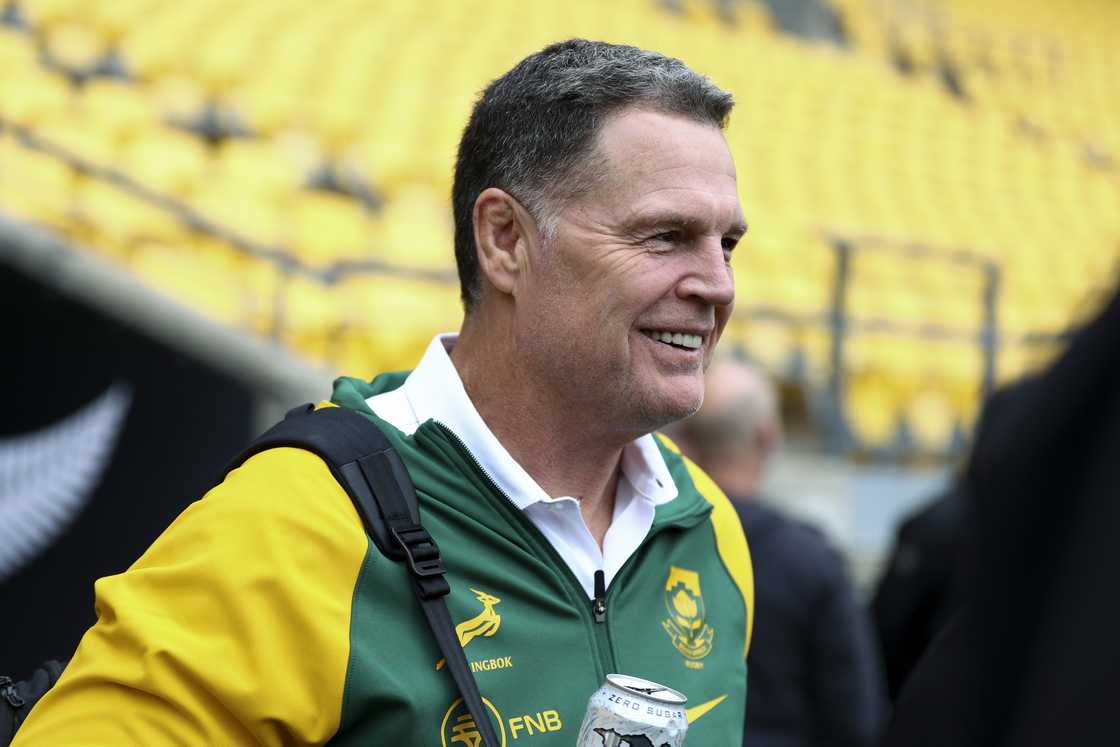World Rugby Introduces Player Workload Guidelines: How the Springboks Are Staying Ahead
- World Rugby has set new rules to limit the amount of time players spend on the field, prioritising their long-term health and safety
- South Africa’s national team has been actively managing who plays and for how long, giving opportunities to a wider pool of players
- Careful planning by the coaching staff has helped the team maintain high performance levels while reducing the risk of fatigue and injury
World Rugby has introduced strict new guidelines aimed at managing player workloads, designed to protect athletes from the physical and mental demands of the game. These regulations will apply to both men’s and women’s rugby worldwide.

Source: Getty Images
The guidelines were developed by a panel of leading experts, including player representatives, unions, tournament organisers, and regional bodies from across the globe.
Supported by scientific evidence, the measures adopt a precautionary approach to player welfare, aligning with existing World Rugby policies. They are intended to act as a safety net where no local agreement on player workload currently exists.

Read also
Inside the payslip of a South African train driver: Salary, benefits, and career requirements
DON'T MISS IT: Stay Away From Fake News With Our Short, Free Fact-Checking Course. Join And Get Certified!
What are the new guidelines?
Key recommendations include:
Playing no more than 30 matches per season or six consecutive weeks of play
Taking a dedicated five-week off-season break
Receiving at least one week of rest when selected for international fixtures
Having 12 weeks of non-contact time throughout the year
Maintaining clear communication between club and country
In prioritising player welfare, World Rugby has made compliance with these guidelines a condition for approving the new Nations Championship, scheduled to begin in the summer of 2026.
World Rugby Chairman Brett Robinson said the guidelines are the result of years of intense negotiation and congratulated all involved in reaching the agreement.
He added that, like all World Rugby policies, the measures are grounded in the latest scientific research and expert opinion.
As seen in the tweet below:
Robinson expressed hope that unions and competitions will eventually reach local agreements tailored to the specific needs of players, but in the meantime, the guidelines provide a solid backstop.
He emphasised that as the sport grows, players can be confident that they are supported not only by their clubs and unions but also by World Rugby at the highest level.
Impact of the guidelines on the Springboks
For the Springboks, the new guidelines reinforce a system they have already embraced. Head coach Rassie Erasmus has successfully rotated the squad this season, blending youth with veteran experience to ensure player fitness and welfare remain a priority.
Ahead of their 67-30 win over Argentina on 27 September 2025, Erasmus noted that the squad had trained together for over 13 weeks, preparing them thoroughly for the match.
Across the last eight games, including the Barbarians fixture, 46 players were utilised, demonstrating the effectiveness of the rotation policy.
This extensive rotation has allowed the coaching staff to maintain peak performance while giving more players exposure to international competition.

Source: Getty Images
Erasmus highlighted that the combination of younger and experienced players has been particularly beneficial, contributing to recent strong performances.
While only a limited number of players can be selected for each match, the coaching staff continues to monitor others for future opportunities.

Read also
"Poverty is disheartening": Video of dramatic rush to SASSA station in mall sparks outrage in SA
Despite criticism from former captain Jean de Villiers, who questioned the rotation policy, the new World Rugby guidelines underscore the importance of managing player workloads. South Africa is already ahead of the curve in this regard, having adopted a system that prioritises both performance and player welfare.
Matt Williams praises Springboks
Briefly News previously reported that former Scotland coach Matt Williams, long known for his outspoken criticism of South Africa’s tactics, has offered rare praise for the Springboks.
He also warned that Ireland risks falling behind if it fails to adapt to the evolving attacking styles in world rugby.
PAY ATTENTION: Follow Briefly News on Twitter and never miss the hottest topics! Find us at @brieflyza!
Source: Briefly News


